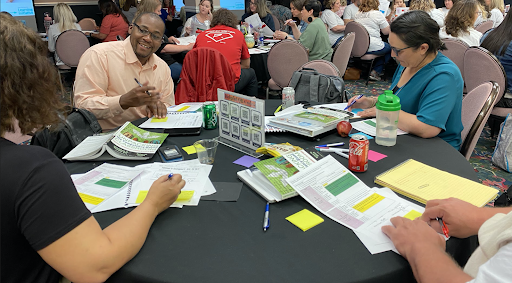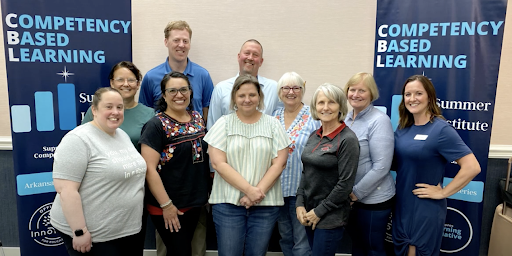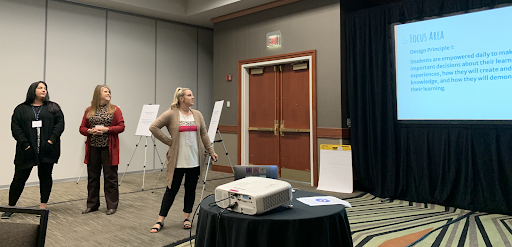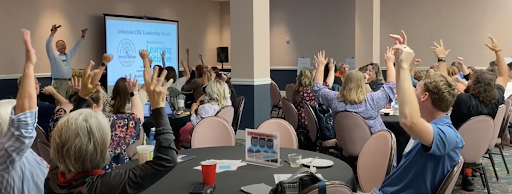Get support for student success - right in your inbox
NHLI | New Hampshire Learning Initiative
All Students Deserve a Quality Education
/ December 22, 2022
Scaling Competency-Based Learning at a State Level

One of the greatest challenges facing educators related to competency-based education is how to effectively scale. Many of us who have been involved in developing competency-based models have learned valuable lessons that can be applied to those at the school, district, and even state level who are tackling this daunting prospect.
Arkansas, a state that has undertaken significant efforts under the leadership of Secretary Johnny Key to change outcomes for all learners through their work with Solution Tree around Professional Learning Communities, continues to push its collective thinking around student-centered learning.
The Office of Innovation for Education (OIE), out of the University of Arkansas, is an intermediary that leads innovative practices across the State of Arkansas. Building on a relationship that began over seven years ago with Jonathan Vander Els, Dr. Denise Airola (Director), Dr. Crystal Beshears Duncan (Innovative Team Project Lead), Marsha Hash (Learning Design and Innovation Leader) and Carolyn Farrell (members of the OIE team) took advantage of a series of workshops that the New Hampshire Learning Initiative was offering around Leadership in a Competency-Based Learning (CBL) environment. Conversations ensued about how OIE and NHLI could partner to support Arkansas educators in deepening their understanding of competency-based learning systems and begin to ingrain these practices within their own schools.

This “grassroots” effort supported by DESE began quite simply with an “all-call” to educators across the state who were interested in learning more about competency-based learning and were willing to collaborate and learn together. As Marsha Hash noted, the hope was that “(t)he opportunity to engage Arkansas administrators and teachers in the CBL leadership cohort, focusing on the CBL Design Principles, would harness the power of collaboration to change practices toward a more equitable, student-empowered learning environment” throughout Arkansas. This resulted in about 40 educators initially interested in virtually attending a series of workshops around the Aurora Institute’s seven design principles of competency education as well as deepening their understanding of Professional Learning Community practices, using the newly released Unpacking the Competency-Based Classroom: Equitable, Indivdualized Learning in a PLC at Work © (Vander Els and Stack, 2022, Solution Tree) as a key resource.
We found that through these virtual offerings, initial members began bringing colleagues from their schools to the table to share in the learning. We had encouraged participants to develop school-level teams with representation across roles, with administrators and teachers as part of the learning together (this is key, more below on this). Through a reflective process, using this rubric created by Brian Stack and Jonathan Vander Els, participants reflected on both relative areas of strength as well as areas for growth for their schools. Based off of these reflections, teams developed an action plan of unique next steps for their schools and teams. This initial learning culminated with over 40 educators from across the state convening to share learning and identify an action plan for the coming year during the 2021 OIE Rally in Little Rock.

It is impossible to tackle everything at once, so teams identified key areas that they wanted to focus on within specific principles of competency-based learning. For this group of Arkansas educators, performance assessment design and metacognition rose to the top. We then provided focused professional development and support in these two areas, with participants developing content knowledge, developing assessments and reflective practices that they would implement in their own schools and classrooms, and then coming back together to share their learning through products, artifacts, student work, and reflection. High school teacher Morgan King reflected back on her engagement in the metacognition series and its impact on her students by noting that “After attending (this training), I took the resources that were provided for us and began to use them in my classroom. It made such a positive difference in student engagement. Using these resources allowed students to identify and take ownership of their learning targets, what they needed from the lessons in order to meet their learning targets, and their learning gaps all on their own. It also allowed me to easily identify the learning gaps based on their responses and create a meaningful reflection leading me to identify areas that I needed to reteach or approach differently for my students.” Morgan’s experience is one we’re trying to replicate across the cohort, and ultimately, across the State of Arkansas.
With the help of teacher turned OIE Coach Chrissy Waldhoer, we were able to take this collaborative learning model to the next level through OIE’s Competency-Based Learning Summit in June of 2022. At this summit, Jonathan Vander Els, Kathy White, and Nicole Woulfe joined the OIE team in supporting over 100 educators from across 10 teams in reflecting on their ongoing work, while providing specific breakout sessions on standards-based grading, formative assessment, and co-designed learning (learning experiences collaboratively designed by students and teachers).

As we head into 2023, we will continue to target support based upon the unique needs of Arkansas educators. Rubric design and equitable grading and reporting in a competency-based system will be the main areas of focus. We will also support building leaders directly with scaling this work across schools. And our learning will once again be shared at the June, 2023 OIE Rally in Rogers, AR.
We’ve learned a lot about the key considerations for scale that must be included through our experiences. Below, we share five key areas that we would encourage you to consider how to best incorporate into your learning:
(1) Teams, consisting of administrators and teachers, are included in the work together from the beginning.
This shared learning experience will help to move the work forward meaningfully in schools. In the Arkansas Cohort, there has been consistent participation from stakeholders from all levels of the system, including teachers, principals, district-level administrators, as well as ongoing DESE participation from Lupe Peña de Martinez, Director of Student Support Services.
(2) A tight and loose philosophy must be employed to provide ownership in the learning.
The work with the seven design principles provides the guardrails for teams related to the “what” of competency-based learning. The loose exists through these same teams determining their areas of focus based upon the unique attributes of their school.
(3) Facilitated opportunities to share learning together are critical.
Providing for more “formal” opportunities for teams of teachers across the state to convene and to help co-design what that learning will look like is key. OIE developed a state-level guiding coalition to help determine the direction of this work, and has provided annual opportunities for this community of practice in Arkansas to learn from each other
(4 ) A local agency to support, communicate, and coordinate the training and support.
The Office of Innovation for Education has been a critical partner and resource in deepening the work across the State of Arkansas. Not only do they have important context to help guide the work, they are all dedicated educators who support each of these schools in meaningful ways throughout the year. As OIE Director Denise Airola commented regarding their role, “Standards-based grading and competency-based learning empower students, parents, and teachers to transparently recognize and evaluate students’ learning as they progress through their educational milestones. Our job is to expand educators’ efforts by growing a field-based network of support for this critical future-focused work.”
(5) Reflect often, and use this reflection to guide next steps.
The collaboration of NHLI and OIE with Arkansas educators has evolved and been refined numerous times over the course of the past two-and-a-half years. This is because the needs of teachers, administrators and teams have changed as unique challenges within schools have been encountered. Flexibility, and a willingness to adapt are key, as is recognizing progress and growth within the work. This reflection happens throughout the cohort, not only with NHLI, OIE, and DESE, but also with the teams who are part of the learning. As principal Shirley Taylor from Wynne Intermediate School reflected, “We have had to take a step back and reflect on our current practices. In doing this, we have realized that change is necessary in order to truly encourage success among each student. We realize this is a process, but in order to continue and not stop in discouragement, we must take time to celebrate the small steps along the way!”
The work of changing systems in schools presents numerous challenges. Scaling these changes with fidelity offers even more challenges, especially at the state level. But by moving slowly, listening to educators, providing targeted, meaningful support to meet teams of educators’ needs in schools and in the classroom, and developing state-wide support systems through communities of practice, we can continue to change outcomes for students through student-centered, competency-based practices.
About the Author: Jonathan is the Director of Collaborative Learning for the New Hampshire Learning Initiative and is co-author of the newly released Unpacking the Competency-Based Classroom: Equitable, Personalized Learning in a PLC at Work (Solution Tree, 2022) written with Brian Stack, and Breaking With Tradition: The Shift to Competency Based Learning in PLCs at Work (Solution Tree, 2018), also written with Brian Stack. Formerly, Jonathan was a principal in an elementary school recognized nationally as a model Professional Learning Community and competency-based school. Jonathan has consulted and coached at schools and districts throughout the United States and has presented nationally at conferences and Institutes on Professional Learning Communities, Competency-Based Learning, Grading and Reporting, and Assessment Design. Jonathan lives with his wife and three children on the New Hampshire Seacoast.
Categories: CBL Leadership and Structural Support Competency-Based Learning (CBL) Teacher Leadership
